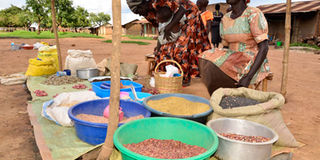Uganda not meeting Malabo declaration on agric funding

Farmers sell their agricultural produce by the roadside. The government allocates little money to the agricultural sector. Photo by Rachel Mabala
What you need to know:
Apportionment. Government is supposed to allocate 10 per cent of the National Budget to agriculture every financial year.
Kampala. Uganda is not honouring the 2013 Malabo declaration where it committed to raising agriculture funding to10 per cent annually through Comprehensive Africa Agriculture Development Programme (CAADP).
In the financial year 2015/16, the agriculture sector was allocated Shs479.96b out of Shs18.311 trillion National Budget, representing a 2.6 per cent allocation.
In terms of growth agriculture sector grew by 3.6 per cent in 2013, 2.9 per cent in 2014 and the growth rate of the sector in 2015/16 was at 3.2 per cent.
Meeting in Malabo, Equatorial Guinea in February 2013, African heads of State, including Uganda, committed themselves to funding of agriculture by 10 per cent, which would then translate into a 6 per cent growth of agriculture in each individual country annually.
The declaration was aimed at, among other things, strengthening ‘South to South Cooperation’ to benefit the people of Africa and South America.
Speaking last week at a workshop organised by New Partnership for Africa’s Development (NEPAD), the Permanent Secretary Ministry of Agriculture Animal Industries and Fisheries, Mr Pius Wakabi, said Uganda is not meeting the public expenditure as set in the Malabo Declaration.
Mr Wakabi said since 2003, the CAADP has been Africa’s Agricultural policy framework for transformation, wealth creation, food security, nutrition and economic growth.
“Uganda, like elsewhere, the CAADP process helped put the agricultural sector back on the political agenda, in real terms. However, the share of public sector financing into the sector did not grow as much as expected, nor did the sector meet the growth targets that had been projected,” he said at a two-day workshop held at Sheraton Kampala Hotel.
Mr Wakabi added: “However, an agricultural growth strategy cannot be championed by the Ministry of Agriculture and Animal Industry alone.” He said the sector contribution to economic development still remains strong, revealing that agriculture contributed 22.6 per cent of the national GDP in 2014/15 and contributed to 53.47 per cent of Uganda’s total exports earnings in the same Financial Year.
Mr Wakabi said the issues that affect the sector cut across others including trade and business regulation, interest rates on financing, trade infrastructure, irrigation, nutrition, to mention but a few.
“We should be cognisant of the fact that agricultural growth in Africa requires a multi-sectoral approach to ensure desired rates of transformation and key to note is that; the focus of CAADP to the year 2025 remains the agricultural sector,” he said “adding but with additional commitments in areas such as infrastructure development, nutrition, natural resources, land tenure, and trade that are not the principal mandate of the ministry of Agriculture but are required for agricultural growth.”
He stated that the Sector Strategic Plan (ASSP) alone may not be sufficient to deliver agricultural growth targets as the impetus for growth may be driven by implementation frameworks in sectors other than agriculture.
“Continued emphasis on evidence-based planning with knowledge as a key primary input as well as human resource development and partnerships to revolve systemic capacity bottlenecks as central factors, an enhanced role for the ministries and agencies responsible for Finance and Planning is paramount,” he said.
Other strategies
The other strategies are that renewed focus on stimulating private sector growth and investment in agriculture should be emphasized, alignment of diverse stakeholder interests around the design of integrated programmes adapted at the local level is critical.
“Therefore a lot has to be done in streamlining the sector priorities with the continental framework including CAADP. I call upon us as key stakeholders to work closely to transform the sector through better Intersectoral coordination and cooperation,” he pointed out.
The team leader CAADP at African Union Commission, Mr Ernest Ruzindaza, said some of the Malabo Declaration elements are job creation by providing 30 per cent of youth employment to African youths in agriculture and reducing the post-harvest losses by 50 per cent by 2025, among others.
“Having investment plan is not enough more ownership and consistence from the government side on public expenditure funding is needed,” he said, adding: “The resources for CAAP have to be budgeted for and implemented in a multi-year comprehensive spending plan in the ministries of Finance and agriculture.”




